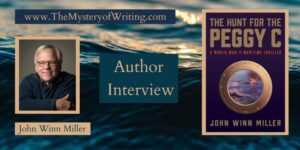It’s Summer! So I’m taking a little break from writing about writers who write about murder and doing something a little sweeter!
Book Club Fiction Author Jennifer Gold joins me this week to talk about her debut novel with Lake Union Publishing. Welcome Jennifer!
(Still need more murder? Read my post on mystery and thriller novels launching through December by clicking the link here.)
The Author
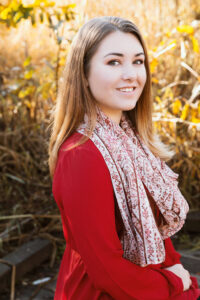 A proud Pacific Northwest native, Jennifer Gold got started writing women’s fiction during her time as a baker. She has a passion for writing about the relationships of career-focused women — the victories, the struggles, and everything in between.
A proud Pacific Northwest native, Jennifer Gold got started writing women’s fiction during her time as a baker. She has a passion for writing about the relationships of career-focused women — the victories, the struggles, and everything in between.
When she’s not writing books, Jennifer can be found spending time with her husband, horse, and two cats. She has a weakness for espresso, ice cream, and chocolate. Jennifer holds a master’s degree in writing and lives in Washington state.
To learn more about Jennifer, click on the following links: Facebook, Twitter, Goodreads, and Instagram.
The Book
 A delicious novel about the sweet and sour ingredients of life and love.
A delicious novel about the sweet and sour ingredients of life and love.
Elle, an accomplished baker, has a recipe for every event in her life. But when she discovers her husband’s infidelity, she doesn’t know what to make of it. Jam, maybe? Definitely jam.
Fed up with the stale crumbs of her marriage, Elle revisits past recipes and the events that inspired them. A recipe for scones reminds her of her father’s death, cinnamon rolls signify the problematic courtship with her husband, and a batch of chocolate cookies casts Elle in a less-than-flattering light. Looking back, Elle soon realizes that some ingredients were missing all along.
After confronting her husband, Elle indulges her sweet tooth in other ways, including a rebound that just leaves her more confused. As secrets from the past collide with the conflicts of the present, Elle struggles to manage her bakery business and maintain the relationships most important to her. In piecing her life back together, will Elle learn to take the bitter with the sweet?
To buy the book, click the link here.
The Interview
How did baking and writing come together for you?
It probably won’t come as a surprise to learn that I spent a few years working as a baker. I was in college, and the place was a cute café that also specialized in coffee, breakfast, and sandwiches. The baking wasn’t as technical as what you might find on the Great British Baking Show, but I made the whole nine: pastries, pies, cakes, cookies…
Unlike the other employees, I spent all my time in the back room, often alone. For a writer, that’s the perfect time to make up stories. I loved the dynamic of the bakery—the up-front workers and the back-room workers, the pace, the odd hours. I was also inspired by the owner, a strong woman who was cheerful and meticulous and cared so deeply for her business.
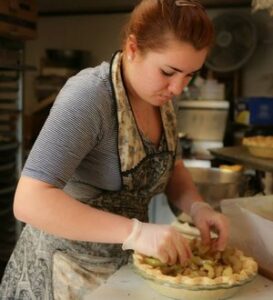 However, it wasn’t just the setting that got me thinking about a book. When I interacted with customers, I found a common yet unexpected theme taking place: food is tied to something much greater than just our taste buds.
However, it wasn’t just the setting that got me thinking about a book. When I interacted with customers, I found a common yet unexpected theme taking place: food is tied to something much greater than just our taste buds.
Everyone has a recipe that reminds them of an experience or person. To name a few personal examples: crème brulee reminds me of my husband, because we always share it on our anniversary; most chocolate recipes remind me of my mother, especially the mousse she makes every year for my birthday; bread pudding reminds me of my brother (it’s a secret recipe he decoded just from taste); peanut butter milkshakes remind me of Tuesday afternoons when my dad would pick me up from middle school; bear claws remind me of piano class when I was little; and…you get the idea.
We all have recipes—especially sweet recipes—in our lives that conjure up much more than just indulgence. Food can be tied to family, experiences, and more. Just a taste can transport us to places we long forgot, or evoke emotions so strong we weep.
The reason I knew I had to include real, on-the-page recipes in The Ingredients of Us is because I wanted the reader to truly grasp that concept—and grasp it with the hands of a baker. The book is about so much more than just recipes—career, relationships, and how to balance the two—but at its heart, the recipes serve as a lens through which my main character Elle views everything else in her life.
“My female characters don’t necessarily end up with Prince Charming, but they always end up with a better version of themselves.”
We get to enjoy the delicious recipes embedded in your novel. Where did they come from? Are they yours? Passed down? Learned while you worked professionally? How did you choose which ones to include?
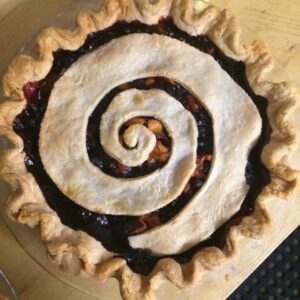 All of the above! Some are family recipes, work recipes, and favorites from books. However, they have been tweaked and adapted by me. The descriptions are all my own.
All of the above! Some are family recipes, work recipes, and favorites from books. However, they have been tweaked and adapted by me. The descriptions are all my own.
I chose the recipes based on the characters and context. I often asked myself, “If I was going through XYZ, what would I bake to make myself feel better?” I loved playing with taste, smell, and texture to draw out the emotions my characters were feeling.
You live in an amazing place. How does your environment impact your writing?
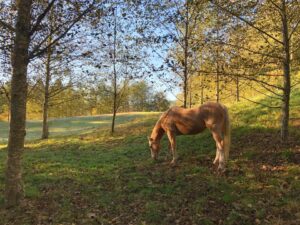 It’s true—I live on a 50-plus-acre farm on the Olympic Peninsula of Washington, where I work as a horse caretaker. Honestly, it’s hard NOT to be inspired by where I live: the ocean, the mountains, the evergreens…I could write a hundred books that take place in the Pacific Northwest—and I’m on my way.
It’s true—I live on a 50-plus-acre farm on the Olympic Peninsula of Washington, where I work as a horse caretaker. Honestly, it’s hard NOT to be inspired by where I live: the ocean, the mountains, the evergreens…I could write a hundred books that take place in the Pacific Northwest—and I’m on my way.
My new novel, Keep Me Afloat, which releases in the spring of 2020, takes place in my hometown of Port Townsend and on a whale-watching boat in the Puget Sound.
My current work-in-progress is about horses on a farm not unlike where I live. I feel incredibly blessed to have grown up on the OlyPen—it’s one of the most beautiful places on earth, and I love sharing an inside look with my readers.
‘Book Club Fiction seems to get closer to the heart of the genre—stories that are discussable, multi-layered, and tackle complex themes.’
Your work is often called Women’s Fiction or Book Club Fiction, what do those terms mean to you? Are there other ways you would characterize your work?
I really struggle with the term Women’s Fiction, because I think it makes it sound like it’s a genre exclusive to women, when in reality, I know many men who write and read WF. Book Club Fiction seems to get closer to the heart of the genre—stories that are discussable, multi-layered, and tackle complex themes (one might argue that this is simply “general fiction,” but perhaps that is not a specific enough label).
As one might guess, women’s fiction books are most often about women: mothers, non-mothers, sisters, daughters, wives, girlfriends, grandmothers. Unlike romance, which contains plots that are driven first and foremost by a love interest and guarantees a “happily ever after,” women’s fiction plots can explore relationships of all kinds, not just romantic. Women’s fiction novels can span historical fiction, suspense, thriller, contemporary, and more.
My favorite definition is from the Women’s Fiction Writers Association: “Women’s fiction heightens human connection, engenders empathy, and illuminates new perspectives. [It features] layered stories in which the plot is driven by the main character’s emotional journey.”
As for my own writing, my simplest description is this: I write contemporary stories about the relationships of career-focused women — the victories, the struggles, and everything in between. My female characters don’t necessarily end up with Prince Charming, but they always end up with a better version of themselves.
” . . . when it comes to meeting my needs and expectations as an author, Lake Union goes above and beyond.”
What has it been like working with Lake Union Publishing?
Frankly, I love Lake Union Publishing—I loved what they were up to long before they offered me a publishing contract, and now that I’m on the inside, I love them even more. They are author-centric, have incredible marketing prowess, and they produce very beautiful books (inside and out!). I am very happy with their professionalism and the degree to which they involve me in the book-producing process (such as having input on my covers!).
With Lake Union, I have access to a robust digital marketing machine (that never forgets my backlist!), and author-communication is through the roof. They’re incredibly forward-thinking and supportive of their authors. For Ingredients, I received hardcovers, paperbacks, ebooks, and audio. Plus, ARCs!
For those who don’t know, Lake Union is one of the larger imprints of Amazon Publishing. This is not to be confused with self-publishing through CreateSpace—A-Pub is a traditional publisher with a digital-marketing focus.
I could go on and on about the pros and cons, but let’s leave it at this: when it comes to meeting my needs and expectations as an author, Lake Union goes above and beyond.
What are you working on now?
As I touched on earlier, I’m working on two books! The first is my 2020 release, Keep Me Afloat, which is about a marine biologist returning to her hometown after a tragedy sent her away. The book has lots of coffee, whales, and Olympic Peninsula beauty. I’m currently working with my acquisitions editor on polishing it up before sending it off to the copyeditor!
I’m also editing a book about a farm manager whose life is turned upside down with the arrival of four troublesome rescue horses—and her ex-husband.

(Something tells me your beautiful environment is going to be very helpful in writing that third book!)
Final words of wisdom:
Short version: Never stop learning. Read a lot and write a lot.
Longer version: I highly recommend writers’ conferences and organizations—I learn more from these communities than anywhere else and have made invaluable lifelong friends and professional contacts. There is always something to learn, whether it’s craft advice or a marketing tip—so take yet another craft class, ask for advice from the authors and professionals you admire, and soak it all up like a sponge.
On writing: Let go of your inner perfectionist. I see so many beginning writers struggle with writer’s block because they don’t keep their inner perfectionist in check. My best advice? Vow to never let anyone read your first draft. That’s right, no one. By making this vow, you allow yourself to simply write.
If no one is ever going to read the first draft, it doesn’t need to be perfect. In fact, it doesn’t even need to be coherent—it just needs to be finished, so you can start editing. You can’t edit a book knowledgeably, strategically, or efficiently without having a full draft written down first.
I don’t let anyone read my books until I’ve written the first draft and edited the whole book at least once (but usually three or four times, because my first drafts are MESSY). The point is: allow yourself to be creative and have fun without the worry of whether or not it’s “good,” and you’ll end up editing it into something definitely great. (This is GREAT advice!)
On reading: This is self-explanatory. Read a lot so you can see how the masters do it. There’s always something to be gleaned. Read in your genre, read craft books, read articles, and read fiction in other genres. It’s all useful.
And one more thing, with regard to publishing: be patient and focus on finding the right fit.
Congratulations on finding the right home for your work! So excited to follow your career.
Header Photo by RitaE on Pixabay. Click the link here for more information.


